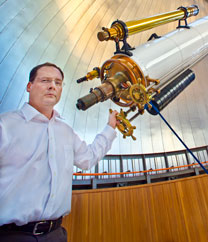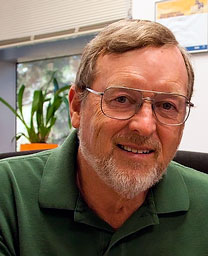Keynote Speakers

Speaker : Peter Nugent
Affiliation : Lawrence Berkeley National Laboratory
Website: http://www.lbl.gov/~nugent
Title: The Palomar Transient Factory
Abstract : Astrophysics is transforming from a data-starved to a data-swamped discipline, fundamentally changing the nature of scientific inquiry and discovery. New technologies are enabling the detection, transmission, and storage of data of hitherto unimaginable quantity and quality across the electromagnetic, gravity and particle spectra. The observational data obtained during this decade alone will supersede everything accumulated over the preceding four thousand years of astronomy. Currently there are 4 large-scale photometric and spectroscopic surveys underway, each generating and/or utilizing hundreds of terabytes of data per year. Some will focus on the static universe while others will greatly expand our knowledge of transient phenomena.
Maximizing the science from these programs requires integrating the processing pipeline with high-performance computing resources. These are coupled to large astrophysics databases while making use of machine learning algorithms with near real-time turnaround. Here I will present an overview of one of these programs, the Palomar Transient Factory (PTF). I will cover the processing and discovery pipeline we developed at LBNL and NERSC for it and several of the great discoveries made during the 4 years of observations with PTF.
Speaker Bio : Nugent is the Division Deputy for Scientific Engagement in the Computational Research Division at Lawrence Berkeley National Laboratory (LBNL). His research focuses on the use of high performance computing to tackle problems spanning data analysis and theoretical simulation in cosmology and astrophysics. He came to Berkeley in 1996 after receiving his PhD at the University of Oklahoma to work with the Supernova Cosmology Project in the Physics Division where the team made the first measurements of the accelerating universe. In 2008 he co-founded the Computational Cosmology Center and became their first Group Leader. He was promoted to Senior Staff Scientist at LBNL in 2010 and the same year joined the faculty in the Astronomy Department at UC Berkeley.

Speaker : Ken Joy
Affiliation : University of California, Davis
Website : http://graphics.cs.ucdavis.edu/~joy/
Title: Some Difficult Visualization Problems -- Big Science, Big Computer Systems, and Big Data
Speaker Bio : Ken Joy is a Professor in the Computer Science Department at the University of California at Davis. He came to UC Davis in 1980 in the Department of Mathematics and was a founding member of the Computer Science Department in 1983. Professor Joy's research and teaching interests are in the area of visualization, geometric modeling, and computer graphics.
He is the Director of the Institute for Data Analysis and Visualization (IDAV) at UC Davis. This Institute provides an interdisciplinary research environment where practical data exploration problems from a variety of driving applications can be addressed. Within this environment, and with his research colleagues and graduate students, Professor Joy has collaborated on a large number of projects involving large-scale data analysis, multiresolution modeling, computer vision, data compression, flow visualization, query-driven visualization, and the visualization of uncertainty. He is the principal investigator, or co-principal investigator, on a number of grants involving material interface reconstruction, exploration of wide-area high-resolution aerial video, flow visualization, and uncertainty visualization.